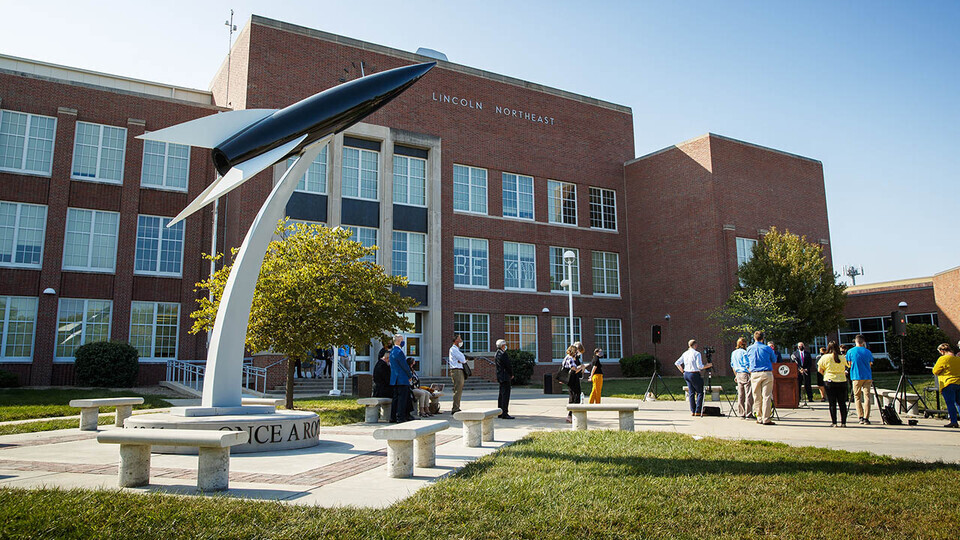
Lincoln, Neb. —Lincoln Public Schools and the University of Nebraska–Lincoln’s College of Agricultural Sciences and Natural Resources are joining together to launch the LPS-UNL Early College and Career STEM Program at Lincoln Northeast High School. LPS and the university celebrated the launch of the program during an event at Lincoln Northeast on Tuesday.
Through hands-on, immersive experiences and early college pathways, the program will prepare Northeast students in the areas of food, energy, water and societal systems, which are collectively known as FEWS2. Pathways are designed for students who wish to pursue a two- or four-year college degree, as well as students who plan to enter the workforce after graduating high school.
LPS and CASNR will also work with ag- and natural resources-based businesses, commodity groups and other partners to build internships and other experiences to enhance the program.
“This is an exciting new opportunity for our students and aligns our goals of empowering our students to find academic success through authentic learning opportunities, rigorous standards and individualized learning,” LPS Superintendent Steve Joel said. “We have had many successful partnerships with the university, and this is just another example of the great collaboration between our two institutions that will benefit our students and community.”
The program is designed to provide pathways for learners at Northeast High School that are interested in FEWS2. Examples include:
-
Students who plan to enter the workforce after high school graduation can earn non-credit competencies in certain areas that will give them an edge as they look for employment.
-
Students will be able to earn college credit for classes that will transfer to Nebraska and other post-secondary institutions.
-
Students who earn a certain number of credits can earn a certificate of college credit, which they can use to seek work after high school or can put toward a four-year degree.
Most importantly, students will be able to explore careers in agriculture and natural resources.
Craig Chandler | University Communication Tiffany Heng-Moss, dean of agricultural sciences and natural resources at Nebraska, speaks Sept. 22 during the announcement of the LPS-UNL Early College and Career STEM Program at Lincoln Northeast High School. Behind her are IANR Harlan Vice Chancellor Mike Boehm (left) and Chancellor Ronnie Green.A summer enrichment program built around FEWS2 concepts will take place in summer 2021. Beginning in fall 2021, FEWS2 concepts will be integrated into Lincoln Northeast’s ninth- and 10th-grade math and science curriculums. In fall 2022, 11th- and 12th-graders will begin to enroll in early college credit classes and explore non-credit pathways. On- and off-ramps are built into the program for students who decide it’s not for them, enroll later in their high school career or drop out of the program and rejoin.
“As a first-generation college student who pursued an education and career in agriculture and life science, I know I would have benefited greatly from a program like this,” said Nebraska Chancellor Ronnie Green. “I am personally so excited for the Lincoln Northeast students whose career options are going to expand because of this partnership between the university and LPS.”
The program is designed to be affordable and accessible to students and their families. Non-credit experiences will be available to students for free. Student who opt to take classes for college credit will receive reduced tuition.
Lincoln Public Schools and CASNR have a long history of collaborating to create enriching, hands-on programming related to agriculture, life sciences and natural resources.
Nearly 20 years ago, LPS, CASNR and the Lincoln Children’s Zoo joined together to launch the Our Zoo to You program, in which animals from the zoo lived in LPS elementary classrooms for six weeks and were incorporated into reading, writing, science and math curriculum. Other successful programs, including Bug Bash and the Summer Soybean Institute, followed.
Tiffany Heng-Moss, dean of agricultural sciences and natural resources, said all of these programs challenged LPS students to use design thinking and scientific inquiry and have prepared them to meet the challenges of a changing world. The Early STEM program is no different.
“We built this program to meet students where they are at and help prepare them for future careers in the growing areas of food, energy, water and societal systems,” Heng-Moss said. “In Nebraska, one in four jobs is related to agriculture and natural resources, and a prepared workforce with highly developed problem-solving and critical-thinking skills will be essential to Nebraska’s future success. I am so proud of this partnership and the opportunities it will bring for students and for Nebraska. CASNR is excited to partner with LPS and the agriculture and natural resources industries, commodities and other stakeholders in Nebraska and work together to prepare the next generation of change-makers.”







